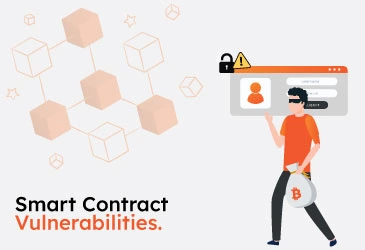Top 6 Alternatives To Blockchain For Businesses
Updated : June 10, 2023

Blockchain technology has gained momentum in recent years for several reasons. Businesses are adopting blockchain due to its applications in popular cryptocurrencies. However, blockchain has scalability issues, causing transactions to take time to authenticate. To address these limitations, there are some reliable blockchain alternatives that offer better performance. Businesses may consider these alternatives to reduce costs, simplify integration challenges, and streamline development. Being experts, we always suggest you have smart contract audits done for your system.
Before exploring these alternatives, let's understand how blockchain works
Blockchain acts as a database that stores digital data in chained blocks. Each block stores information and is linked to the previous block, forming a chronological chain of interconnected data. Blockchain technology helps organizations in sharing data, maintaining its integrity, and security without the involvement of third parties. It securely stores and distributes data without making changes or edits. The permanence of stored information prevents it from being reversed, providing assurance of data safety
Alternatives To Blockchain That Help you In Your Businesses
Multiple blockchain development services offering companies now provide alternative solutions as well. Let's delve into blockchain alternatives.
-
Centralized Databases
When discussing the use of blockchain technology, traditional blockchain enthusiasts often emphasize its decentralized nature. However, there is value in having a centralized database that efficiently manages records.
Decentralized blockchains face scalability issues, especially as more participants join the network. In contrast, centralized databases like Visa offer better scalability per transaction. They remove smart contract vulnerabilities efficiently. For instance, Bitcoin can only handle 4.6 transactions per second, while Visa processes over 1700 transactions per second, equivalent to 150 million transactions per day
Centralized databases are maintained at a single location and managed through a centralized system. This enables easier access and coordination of data. However, if the centralized database system experiences a failure, the data stored within it may be lost.
-
Centralized Ledgers
Moving on, we have centralized ledgers, which are systems where a single authority controls and handles the compilation of all transactions. This centralized control allows for tracking a company's assets, liabilities, equity, revenue, and expenses in a centralized ledger known as a general ledger.
A ledger is necessary for recording any transaction, regardless of its value, even if it's as small as a penny. Nowadays, computerized ledgers like Enterprise Resource Planning (ERP) serve as a central repository for accounting purposes, consolidating data from various sub-ledgers such as cash management, fixed assets, purchasing, and projects.
For organizations managing financial and non-financial data, a general ledger is essential as it serves as the backbone of their financial record-keeping. It represents the collection of all accounts usually in web3 gaming. In cases where computerized systems are not preferred and manual processes are favored, a large book may be used. Accounts in the general ledger can span one or multiple pages.
For a long time, centralized ledgers have been used to manage accounting tasks, including recording financial transactions with other companies and entities for financial analysis, tax reporting, and more. However, this approach has a disadvantage despite its efficiency. The ledger is susceptible to mistakes made by the central authority, whether intentional or unintentional.
-
Distributed Databases
Distributed ledger technology is a recent advancement that aims to decentralize bookkeeping and eliminate a single point of failure by removing the central authority. Bitcoin's Blockchain stands as a successful example of decentralized ledgers
A distributed database expands beyond a single computer or network and is spread across multiple computers or networks, appearing as one cohesive unit. Its physical components are located in different places, without sharing physical components. The main objective of distributed databases is to provide efficient and cost-effective services while ensuring scalability.
However, it is important to note that distributed databases not only require data redundancy but also necessitate data and network security to prevent data theft and misuse of network resources.
-
Cloud Storage
Blockchain technology has gained familiarity for storing data across multiple nodes, offering redundancy. However, as enterprise data volumes increase, replicating it becomes impractical. In such cases, businesses can opt for reliable cloud storage services hosted in high-quality data centers
Cloud storage divides data into encrypted segments, distributed across the network for decentralized storage. It provides robust security features, including transaction ledgers, encryption, and hashed blocks, ensuring a strong defense against hackers. Cloud storage emerges as a practical alternative to blockchain storage
-
Decentralized Storage
The decentralized system operates like a peer-to-peer network, where multiple users store data instead of a single central server. This approach ensures highly secure, resilient, and scalable storage. It can be achieved through decentralized blockchain-based applications or peer-to-peer networks.
While blockchain is a popular digital ledger, there are other emerging distributed ledger technologies that offer viable alternatives for data sharing and storage.
Corda is one such example, maintaining scalability while utilizing distributed ledgers. In Corda, each transaction is unique and not accessible to others through a shared block structure.
-
Other Distributed Ledger Technologies
Unlike private blockchains that may require permission for certain operations, the DAG (Directed Acyclic Graphs) approach allows applications to write data quickly. However, the confirmation of transactions in DAGs takes more time compared to private blockchains. To tackle this, all types of decentralized applications (dApps) should inform users about conflicts and establish rules within the protocol.
Here are some additional decentralized ledger technology alternatives:
-
Iota Tangle
In the Iota Tangle, every transaction is represented by a node or vertex. This technology was created to facilitate development and establish standards for distributed ledgers. Unlike blockchain, the Iota network expands through transactions instead of resource-intensive mining. It also enables transactions between Internet of Things (IoT) devices, in addition to supporting micropayments
Although it is decentralized, the Iota Tangle still relies on a coordinator node to supervise and verify new transactions in real-time.
-
Hashgraph
Hashgraph is another type of distributed ledger that eliminates the need for mining, unlike blockchains. In Hashgraph, transactions are not validated by miners.
The Hashgraph technology operates on a protocol called "gossip about gossip," which allows network nodes to share information, reach consensus through proof of stake (POS), and add new transactions to the directed acyclic graph (DAG). As new data is added, an audit trail is also attached to the distributed ledger. However, due to POS consensus, there are concerns about its security.
It's important to note that Hashgraph is patented by Swirlds, owned by Leemon, the developer of Hashgraph. As a result, this distributed ledger, unlike blockchain, is not open to the public and is licensed with a 10% fee for developers.
-
R3 Corda
Corda was developed to facilitate the recording and processing of financial transactions for businesses. It follows a peer-to-peer model where data is stored in peers associated with each transaction. This means that to trace an audit trail, one must search across multiple nodes involved in a series of transactions. By ensuring the appropriate peer group, the distributed ledger can enhance transaction security.
Compared to the two DAG-based distributed ledger technologies mentioned earlier, Corda simplifies the creation, automation, and enforcement of smart contract audit checklists, making them a prominent feature of blockchains.
However, there are other alternatives that offer similar functionalities to Corda and may prove to be more effective and preferable than the existing prevalent distributed ledgers. For instance, the Iota Foundation has announced the development of an alpha version of Iota smart contracts, which will provide similar functions to Corda.
-
Conclusion
The amount of business data is increasing, leading to a need for secure and cost-effective storage solutions. Blockchain has introduced decentralized storage systems and some alternatives that offer high security, scalability, and affordability.
Although the technology is still in its early stages, it may take time to be widely adopted. Nevertheless, the advantages of decentralized storage powered by blockchain already surpass those of traditional centralized storage methods, and the technology is expected to improve further in the future.
Take control of your smart contract security - Request a professional Smart Contract Audit today and ensure the solidity of your blockchain projects
Insights

Smart Contract Audit Checklist
Smart contracts are self-executing agreements with the terms of the agreement between buyer and seller being directly written into lines of code ...

How To Audit Smart Contracts?
Smart contracts have become increasingly popular over the years as they provide a more efficient way of executing transactions in a decentralized ...

Smart Contract Vulnerabilities
Smart contracts have revolutionized how we conduct transactions and execute agreements in the digital age. These self-executing programs ...